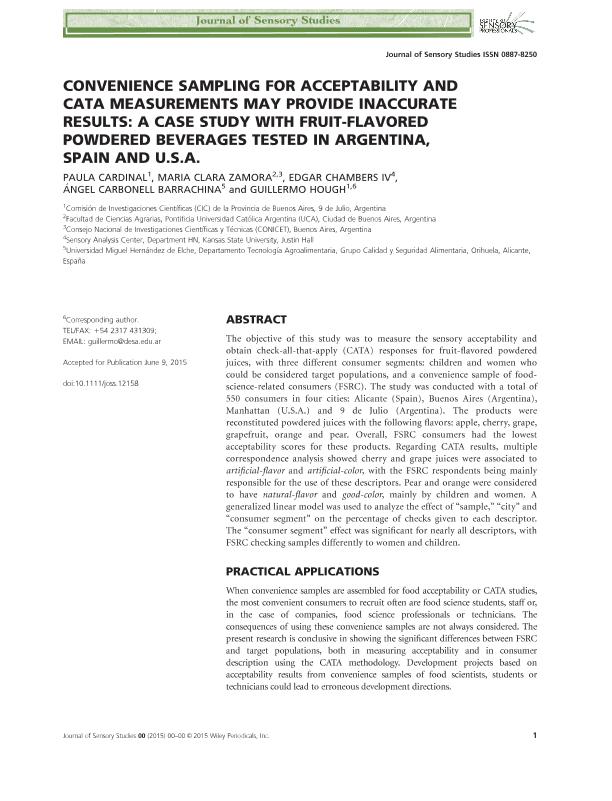Mostrar el registro sencillo del ítem
dc.contributor.author
Cardinal, Paula

dc.contributor.author
Zamora, María Clara

dc.contributor.author
Chambers, Edgar
dc.contributor.author
Carbonell Barrachina, Ángel
dc.contributor.author
Hough, Guillermo

dc.date.available
2018-04-11T20:25:25Z
dc.date.issued
2015-08
dc.identifier.citation
Cardinal, Paula; Zamora, María Clara; Chambers, Edgar; Carbonell Barrachina, Ángel; Hough, Guillermo; Convenience Sampling for Acceptability and CATA Measurements May Provide Inaccurate Results: A Case Study with Fruit‐Flavored Powdered beverages Tested in Argentina, Spain and U.S.A.; Wiley Blackwell Publishing, Inc; Journal Of Sensory Studies; 30; 4; 8-2015; 295-304
dc.identifier.issn
0887-8250
dc.identifier.uri
http://hdl.handle.net/11336/41787
dc.description.abstract
The objective of this study was to measure the sensory acceptability and obtain check‐all‐that‐apply (CATA) responses for fruit‐flavored powdered juices, with three different consumer segments: children and women who could be considered target populations, and a convenience sample of food‐science‐related consumers (FSRC). The study was conducted with a total of 550 consumers in four cities: Alicante (Spain), Buenos Aires (Argentina), Manhattan (U.S.A.) and 9 de Julio (Argentina). The products were reconstituted powdered juices with the following flavors: apple, cherry, grape, grapefruit, orange and pear. Overall, FSRC consumers had the lowest acceptability scores for these products. Regarding CATA results, multiple correspondence analysis showed cherry and grape juices were associated to artificial‐flavor and artificial‐color, with the FSRC respondents being mainly responsible for the use of these descriptors. Pear and orange were considered to have natural‐flavor and good‐color, mainly by children and women. A generalized linear model was used to analyze the effect of “sample,” “city” and “consumer segment” on the percentage of checks given to each descriptor. The “consumer segment” effect was significant for nearly all descriptors, with FSRC checking samples differently to women and children.
dc.format
application/pdf
dc.language.iso
eng
dc.publisher
Wiley Blackwell Publishing, Inc

dc.rights
info:eu-repo/semantics/openAccess
dc.rights.uri
https://creativecommons.org/licenses/by-nc-sa/2.5/ar/
dc.subject
Acceptability
dc.subject
Cata Measurements
dc.subject
Beverages
dc.subject.classification
Alimentos y Bebidas

dc.subject.classification
Otras Ingenierías y Tecnologías

dc.subject.classification
INGENIERÍAS Y TECNOLOGÍAS

dc.title
Convenience Sampling for Acceptability and CATA Measurements May Provide Inaccurate Results: A Case Study with Fruit‐Flavored Powdered beverages Tested in Argentina, Spain and U.S.A.
dc.type
info:eu-repo/semantics/article
dc.type
info:ar-repo/semantics/artículo
dc.type
info:eu-repo/semantics/publishedVersion
dc.date.updated
2018-04-11T15:11:42Z
dc.journal.volume
30
dc.journal.number
4
dc.journal.pagination
295-304
dc.journal.pais
Reino Unido

dc.journal.ciudad
Londres
dc.description.fil
Fil: Cardinal, Paula. Provincia de Buenos Aires. Gobernación. Comisión de Investigaciones Científicas; Argentina
dc.description.fil
Fil: Zamora, María Clara. Pontificia Universidad Católica Argentina "Santa María de los Buenos Aires". Facultad de Ciencias Agrarias; Argentina. Consejo Nacional de Investigaciones Científicas y Técnicas; Argentina
dc.description.fil
Fil: Chambers, Edgar. Kansas State University; Estados Unidos
dc.description.fil
Fil: Carbonell Barrachina, Ángel. Universidad de Miguel Hernández; España
dc.description.fil
Fil: Hough, Guillermo. Provincia de Buenos Aires. Gobernación. Comisión de Investigaciones Científicas; Argentina
dc.journal.title
Journal Of Sensory Studies

dc.relation.alternativeid
info:eu-repo/semantics/altIdentifier/doi/http://dx.doi.org/10.1111/joss.12158
dc.relation.alternativeid
info:eu-repo/semantics/altIdentifier/url/https://onlinelibrary.wiley.com/doi/abs/10.1111/joss.12158
Archivos asociados
